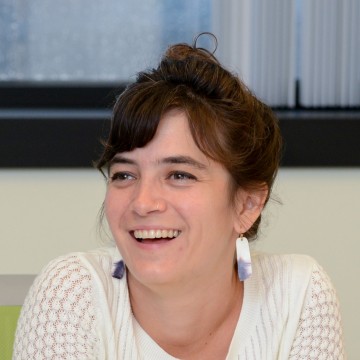Posted in Collaboration
July 22, 2014
I recently read an opinion piece that seems to validate the work we have been doing for the last number of years. In “The end of genius” Joshua Wolf Shenk successfully argues that “the lone genius is a myth that has outlived its usefulness. Fortunately, a more truthful model is emerging: the creative network.”
THIS! My friends, is what we have been working on.
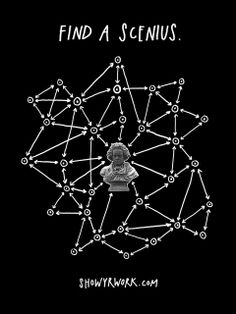
Read More
July 9, 2014
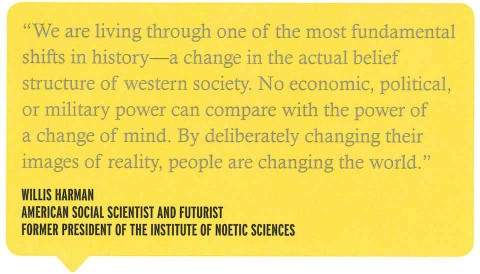
Two recent graduates of a Facilitative Leadership for Social Change workshop Mistinguette Smith and I led in New York, Alison Gold and Juan Sebastian Arias from Living Cities, recently wrote to us about a creative way they are bringing the frameworks and tools they learned back to their organization. So many of you ask us for advice about how to apply this stuff that we thought you’d want to know about it too! Read More
June 24, 2014
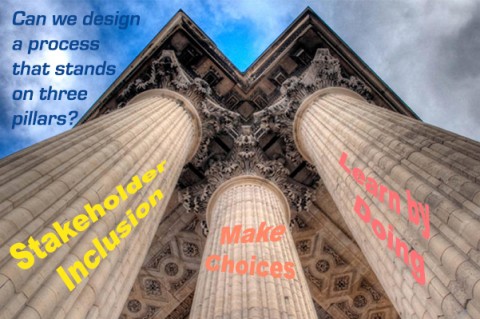
You might have picked up that I’m down on too much process and too much meeting. It’s a funny place for someone that makes a living facilitating. It is part of a semi-conscious effort to look at the opposite of my core assumptions and seek the wisdom there.
Read More
June 17, 2014
I like to describe the Interaction Institute for Social Change as a collaboration shop. I like to describe my work as helping people work better together. Certainly any article tilted “The Collaboration Paradox: Why Working Together Often Yields Weaker Results” is bound to get my attention.
I find this to be a powerful piece, and it confirms intuitions and observations from my ten years of doing this work. It is too often that we collaborate for collaboration’s sake. And it is too often that we fall into the tyranny of a consensus that yields subpar results.
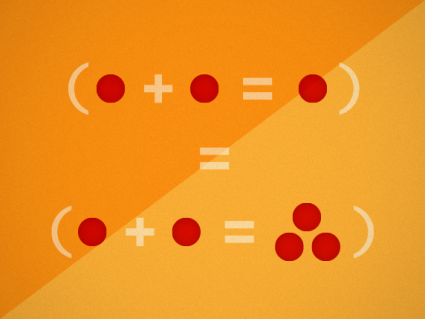
Illustration: Oscar Ramos Orozco Read More
June 3, 2014
If you are a regular reader you’ve heard me talk about the Barr Fellows. It is one of the most powerful experiments in developing a leadership network within a geographic context – the City of Boston. I have the privilege of being on the design and facilitation team for this remarkable project.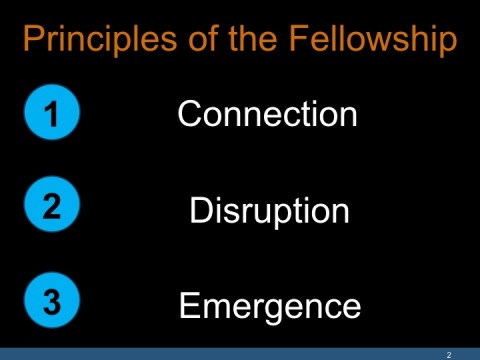 Read More
Read More
May 21, 2014

Photo by Waqas Mustafeez
A question I find myself asking quite a bit of those with whom I am doing network building and collaborative change consulting is some version of, “So whose party is this?” A change or developmental initiative may be born in the mind of a single person or small group of people. And she/he/they invite others to that party, her/his/their party. Then over time, the idea may arise on the part of the invitees that this isn’t just “your” party, but “ours” (collectively). This may not come up so much as a direct statement but through questions about and behavior around power dynamics, how the effort is framed, who to engage, etc. Now what? Depending upon the goal, sometimes your party needs to stay your party, and sometimes it needs to shift, through the emergence of a better question or opportunity. Of course, people may make the decision for you by taking the party with them. Or maybe there are two (or more) parties that ensue, in which case, the question becomes, if you are still welcome, “So whose party am I at right now?” The question is not simply meant to be about ownership, but intent, transparency and equity, and how people can show up in value-adding ways.
May 20, 2014
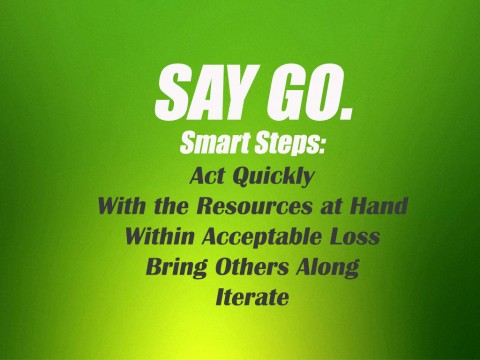
I’ve been thinking a lot about process. What is the best way to get things done? What is the most collaborative and inclusive way to move forward? Our bias towards inclusion, towards a process that is truly democratic, can often seem at odds with the idea that “action trumps everything.” Read More
May 6, 2014
It’s good to plan. It’s good to reflect. It’s best to do.
Here at IISC we spend a fair amount of time supporting others in articulating what they want to achieve, including those who must be included, and defining a pathway to action. When done well, this work depends on a fair amount of reflection on practice – how do you think about what you do? What are you learning about what you do?
We also train people. We help them become better facilitative leaders. We introduce specific practices – specific things people can do.
Without the practice the lessons are lost. We learn by doing.
I was just talking about this in our office kitchen with Danielle Coates-Connor, one of our colleagues, and she compared it to meditation.
It is quite hip to talk about meditation these days. Mindfulness is in. At least in theory. People have a sense that stillness of the mind and present moment awareness are powerful ways to live and thrive. But there is a huge gap between knowing this and practicing this. Too many of us still believe that thinking about meditation is a lot like meditation. But it’s not.
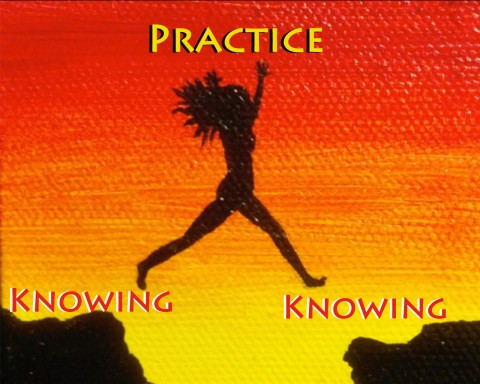
The same is true for our projects and our dreams. We can get the right stakeholders together. We can talk about what we want to do. We can visualize it. We can plot it out. But the learning doesn’t begin until we start. The change does not begin until we do.
Do you wonder:
How to integrate more “doing” in your “planning?”
How to integrate more “doing” in your “reflecting?”
How to start experimenting as soon as possible?
How to start learning?
April 22, 2014
Ceasar McDowell, President of the Interaction Institute for Social Change and Professor of the Practice of Community Development at MIT brings the concept of a “Question Campaign” to our emerging work on Cities.
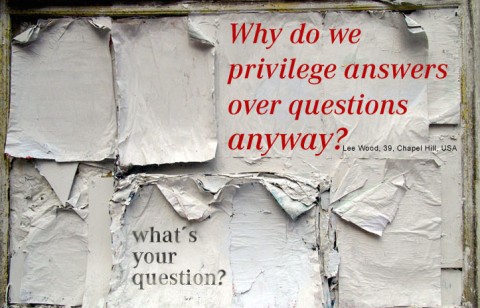
The question campaign is anchored by the premise that “asking questions invites people into conversation, rather than shutting down discussion by giving only answers.” Question campaigns “generate dialogue as a crucial first step in creating actual change on the ground.” Read More
April 14, 2014
Picking up where Gibrán’s post about our interior condition left us last week and my recent viewing of César Chávez, I wanted to lift up a description of love offered by staff of LUPE on a visit I took there last fall. “Love is a process, not a destination. Love is a set of actions that arise from an emotional state or a cognitive commitment.” Recently, I wrote about the power of strong emotions to create the space for breakthroughs. Today, I want to focus on the processes and commitments rather than the emotional states related to love.
When I read and listen to the reflections of people who are deeply committed to social justice, I am struck by their commitment to engaging with people and engaging the struggle in ways that proceeds from a powerful internal compass, even in the face of strong resistance. Think of the standard bearers of nonviolence during the Civil Rights Movement, who practiced non-retaliation in the face of attacks. Think of the painstaking and beautiful reconciliation process in the wake of Sierre Leon’s civil war, where the restoring right relationship between perpetrators and victims began with a public expression of remorse and a request for forgiveness.
In these cases and many others, there was as much attention to the interior condition of the people involved as there was to designing the processes by which they would catalyze change.
How are you attending to your own interior condition as you work for justice? How are you encouraging others to attend to theirs? How does that translate into processes that embody your commitments to love?
April 1, 2014
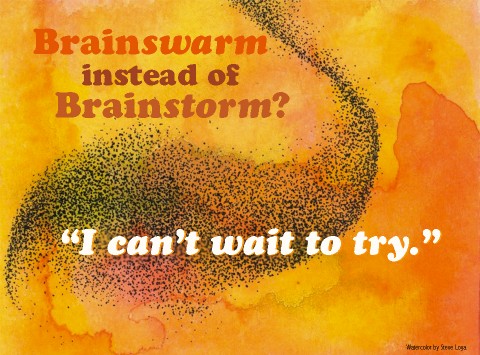
The recent barrage against the effectiveness of brainstorming has been a bit hard for those of us who are grounded in the Interaction Method. But evidence matters, doesn’t it? I know that Curtis has talked about the limits of brainstorming a couple of times in this blog. Read More
February 21, 2014
This post is the third in a three part series exploring the question, “Can collaboration be learned?” Part 1 and Part 2 appeared the last couple of days. This is an edited email exchange between Alison Gold of Living Cities, Chris Thompson of The Fund for our Economic Future, and myself. When we last left off, Alison had posed a series of questions about identifying and cultivating the will to collaborate.
On January 27, 2014 12:33 PM, Curtis Ogden wrote:
Alison, I really like your questions and feel like they would be great to take to a wider audience. I will say that I am profoundly influenced by Carol Sanford’s mentoring in all of this, and the belief that personal development is key to evolving our will, moving from a more self-centered perspective to “other” perspective, to understanding the symbiotic nature of different levels of systems. Read More

